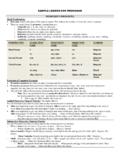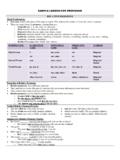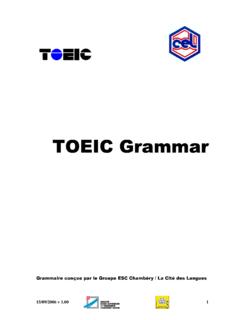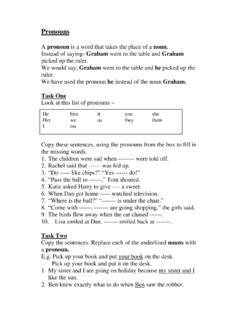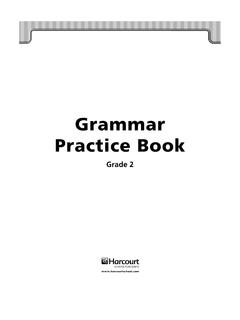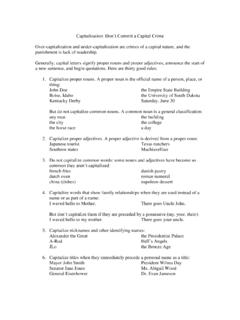Transcription of A Course of Lesson in: Coptic Language
1 Coptic Language Dr. NABIL S. ISSHAK Transcribed by AMBROSE BOLES Suitable for Deacons and Sunday Schools A Course OF LESSONS IN 2 HIS HOLINESS POPE SHENOUDA III POPE OF ALEXANDRIA and PATRIARCH OF THE SEE OF ST. MARK Copyright Dr Nabil S. Isshak Transcribed by Ambrose Boles Date of publication: 15th February 2006 (version 1) 3 ALPHABET Capital letters Small letters Pronunciation Name A a a alpha B b v, b beta G g g, gh, n ghamma D d the, d thelta E e e ey - ^ - co Z z z zita Y y ie ieta.
2 Th theta I i i yota K k k kappa L l l lola M m m mi N n n ni X x x exi O o o o P p p pi R r r ro C c o oima T t t tav U u v, i, ou ipsolen V v f fi < , k, sh, kh ki ' ' ps epsi W w oo oo S s sh shay F f f fay Q q kh khay H h h hori J j g, j ganga { [ ch chima } ] ti ti 4 UNIT 1 To make a Coptic sentence, you need a subject ( noun or pronoun) and a verb. Other components include objects and prepositions. (1) VERBS Verbs given here can be used in the imperative form, for a request or giving an order. Hemci sit heamsi Mosi go/walk moshi [I take chi Cwtem listen soateam Ouwm eat ou-woam Cw drink soah Ouwst kneel/worship ou-woasht `slyl pray eshleel `cmou bless esmou Caji speak saji (2) NOUNS Nouns are used as subjects or objects.]
3 First we shall study single masculine nouns. These take the definite article pi, meaning the , and the indefinite article ou, meaning a . ourwmi a man ou-roami pirwmi the man pi-roami oualou a boy ou-alou Pialou the boy pi-alou Ououyb a priest ou-ou-weep piouyb the priest pi-ou-weep Piervei the altar pi-erfeay Pitotc the chair pitots Piro the door piroh Pilaoc the people pilawos Pima the place pimah 5 Pimanvici the kitchen pimanfisi pikahi the floor pikahi piry the sun piree (Kahiry) Cairo [land of the sun] kahiree Pidiakwn the deacon pi-thiakoan (3) PREPOSITION This is a word ( in , from , to )
4 Often placed before a noun or pronoun to show place, direction source etc. The object separated from a verb by a preposition is called an indirect object. qen in/by khean Ejen/hijen on ejean/hijean nem with neam `e to eah The following sentences are made up from a verb in the imperative, a preposition and an indirect object. Caji nem pirwmi speak with the man Mosi nem pialou walk with the boy `slyl nem piouyb pray with the priest Hemci hijen pitotc sit on the chair Hemci hijen pikahi sit on the floor `slyl qen piervei pray (in) the altar Ouwm qen pimanvici eat in the kitchen (4) VOCABULARY Ari`hmot please (do)
5 Ari-ehmot Ari`hmot cw please drink ari-ehmot soah Ari`hmot hemci please sit down ari-ehmot heamsi `mper do not empear `mpercaji do not speak empear saji Alla but allah `mpercaji alla cwtem do not speak but listen empear saji allah soateam 6 `mpermosi alla hemci do not walk but sit down empear moshi allah heamsi `mperhemci hijen pikahi alla hemci hijen pitotc do not sit on the floor but sit on the chair empear heamsi hijean pikahi allah heamsi hijean pitots Nane good naneah Nane emasw very good naneah eamashoah Nane atoou`i good morning naneah ato-ou-wi Oujai bye bye/cheer you ougay 7 UNIT 2 (1) We have learned the definite article pi meaning the , is used for single masculine nouns.
6 In this unit, two rather special definite articles are presented. These are `p and `v. They are frequently used for single masculine nouns of particular importance in religious texts. `viwt the father efyoat `vran the name efraan `vnou] (the) God efnouti `vry the sun efree `vnobi the sin efnovi `p[oic the Lord epchois `psyri the son epsheeri `pouro the king ep-ou-roh You will be familiar with these special definite articles in the Course of your study, and will hear them all the time in the church liturgy. Note however, that many other religious words take the usual definitive article (pi).
7 Pi`,rictoc (the) Christ pi-ekhristos Pi`pneuma e;ouab the Holy Spirit pi-epnevma eth-ou-wab piagioc the saint pi-ag-yos (2) DIRECT OBJECT An indirect object is separated from the verb by a preposition. In the absence of a preposition, the object is called a direct object. This implies the action of the verb falls directly on the object, the boy drinks milk so milk is the direct object of the verb drink . In Coptic , the common form of verbs is separated from the direct object by one of these articles: `e, `m or `n. These, we call the object signs.
8 (A) Some verbs take the object sign `e Hwc praise hoas `cmou bless ecmou Sari hit/smack shari Areh keep/study areah Cwtem listen/hear soateam 8 [oh touch tchoh Nau see nav swlem smell shoaleam joust look gousht `cmou `e`vnou] bless God ecmou eah efnouti Hwc `e`p[oic praise the Lord hoas eah epchois joust `epialou look (at) the boy gousht eah pi-alou Cwtem `epi`slyl listen (to) the prayer soateam eah pi-eshleel Areh `epiws study the Lesson areah eah pi-oash (B) All other verbs take the object sign `n [I `noutotc take a chair chi en ou-tots Cw `noumwou drink water soah en ou-moa-ou When a noun starts with one of these letters p, m, v, b, the object sign `m is used instead of `n.]]
9 Note that the beginning of a noun is usually a definite or indefinite article. Ouwst `m`p[oic worship the Lord ou-woasht em epchois `slyl `m`vnou] pray (to) God eshleel em efnouti Cob] `mpima prepare the place sovti em pimah (3) OTHER USES OF `m AND `n (A) To mean of , which is a preposition that connects its noun with the preceding noun , adjective, or adverb. Again, the choice of `m or `n depends on the first letter of the second noun . There is, however, the preposition `nte, which also means of , and is used freely regardless of the starting letter of the noun that follows it.
10 `vran `m `viwt the name of the father efraan em efyoat Piouyb `m piervei the priest of the altar pi-ou-weep em pi-erfeay Pisw `nte `viom the sand of the sea pishoah enteah efyom (B) In conjunction with an adjective. As you know, an adjective is a word that describes a quality, or that defines or limits a noun , yellow , great . Pijwm `mberi the new book pigoam emveari 9 Pirwmi `ncabe the wise man pi-roami ensaveh Ounou] `nouwt one God ounouti en-ouwoat Piwnq `n`eneh the eternal life pi-oankh en eneah Note the adjective comes after the noun in Coptic .
